Information about ingredients and product packaging
Basic information about ingredients - food grade or pharmaceutical grade?
Jakke supplements mostly use food-grade raw materials - in joint supplements, all raw materials are food grade, which come from large and reputable raw material suppliers in Finland and Europe.
Why is food grade safer to use than medical grade?
Food-grade ingredients are intended for everyday use and their limit values are much stricter than pharmaceutical-grade ingredients, which are intended for short-term/cure-like use and are intended to be taken only in very small amounts at a time. Therefore, food-grade is much safer for everyday, continuous use – you can use Jakke supplements with confidence for your dog's well-being every day.
Jakke supplements use natural products, so color differences between products may vary.
Fillers or not?
JAKKE JOINT NUTRITION DOES NOT CONTAIN ANY FILLERS, e.g.:
- water
- fish oil/ other oils
- sucrose = cane sugar, ordinary sugar
- glucose = dextrose
- fructose = fruit sugar
- lactose = milk sugar
- dextrose = D-glucose
- inulin = storage polysaccharide formed from fruit sugar
- maltodextrin = starch
- corn starch
- palatinose = carbohydrate
- green flour
- wheat bran
- rice bran
- yeast
- rice flour
- oatmeal
- oatmeal flakes
- feed rye flour
- yeast
Jakkejoint nutrients only contain substances that really affect the joints!
The basic raw materials in Jakke joint nutrients are glucosamine, chondroitin sulfate, hyaluronic acid and MSM, which are already naturally present in the dog's joints, but whose production in the body decreases with age and the joints become hard under heavy stress and the above substances are necessary for the joints. Of these, chondroitin sulfate and hyaluronic acid are joint "oils" that lubricate the joint.
Joint supplements
Disadvantages of joint nutrition:
- it takes about a couple of weeks before it starts to work, if joint nutrients have not been fed before
The pros of joint nutrition:
+ effective in continuous use
+ long-term effect
+ can also be fed preventively and also to young individuals, e.g. with a smaller dosage
+ contains substances naturally present in the joints, e.g. glucosamine, chondroitin sulfate, collagens and hyaluronic acid
+ no doping time
+ safe to use
+ easy to use
Fish oil or not?
According to the latest research, heavy and regular use of fish oil can be dangerous for the liver; causes unfavorable effects in the functioning of liver cells and can also cause fatty liver disease (abundant accumulation of fat inside liver cells). The oils can also often cause heartburn in dogs.
Jakke products do not use fish oil.
Jakke-nivelravinteissa ”öljyjä” ovat kondroitiinisulfaatti ja hyaluronihappo ja ne ovat nivelen luonnollisia ”öljyjä”, jotka voitelevat niveliä.
Joint nutrients or dog foods that claim to contain joint nutrients?
There are some dog foods, dry foods, wet foods and raw foods on the market, which are mentioned as containing joint nutrients (e.g. glucosamine, chondroitin sulfate) but whose quantities are still often not stated in the product description.
Attached is an example of a dry dog food whose product description mentions glucosamine and chondroitin sulfate and where their quantities are mentioned:
- the food mentions that glucosamine is 608 mg/kg and chondroitin sulfate 323 mg/kg
- e.g. the recommended daily dose of this dry food for a 10 kg dog is 115 – 160 grams, in which case the dog receives 69.92 – 97.28 mg of glucosamine per day and 37.14 – 51.68 mg of chondroitin sulfate per day, depending on the dose of the food
- A 10 kg dog should eat 1207.24 grams of the dry food in question, i.e. 1.2 kg per day (!), in order to get the same 734 mg of glucosamine needed for the joints, which it gets from e.g. Jakke Agility with a dosage of 2 ml per day - and for preventive purposes, the daily increase of Jakke joint nutrition can even be halved
Lactic acid bacteria or not?
The use of lactic acid bacteria in dogs is questionable because there is no research on their effect on the functioning of the dog's stomach; lactic acid bacteria work when they are aimed at a specific problem, but when it is not known what lactic acid bacteria should be fed, then feeding them to the dog is pointless. In humans, on the other hand, the use of lactic acid bacteria is a precise treatment, when you know what helps what.
Boswellia serrata
Boswellia serrata is a resin obtained from the tree of the same name, which has been used for millennia. It contains boswellic acids, which have several health effects. It is, for example, good for the joints and their well-being. For example, sea buckthorn fats help the absorption of Boswellia serrata.
Glucosamine
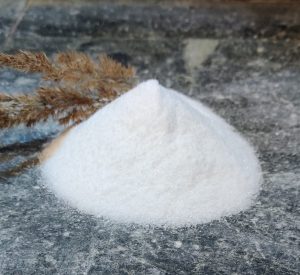
Glucosamine is a naturally-occurring substance in the joints, which decreases with age and is therefore used to prevent and treat joint degeneration. Glucosamine increases cartilage health, protects osteoarthritis from degeneration, and prevents cartilage-destroying enzymes. Glucosamine maintains optimum joint function, slows down the development of osteoarthritis and also suppresses inflammation. The use of glucosamine increases the glucosamine concentration in the joints. About 90% of oral glucosamine is absorbed.
In other Jakke joint supplements, glucosamine comes from shellfish, except in Jakke Run-up glucosamine is vegan.
Hyaluronic acid
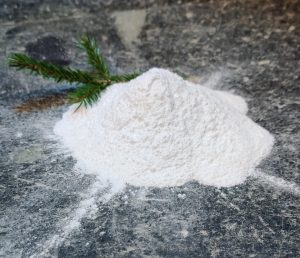
Cartilage tissue and synovial fluid contain a particularly large amount of hyaluronic acid, which absorbs water and thus gains elasticity and is important for the viscous and elastic properties of synovial fluid. Hyaluronic acid acts as a lubricating and shock-absorbing substance in normal joints and softens the impacts on the joints. Hyaluronic acid is a normal component of synovial fluid, the amount of which decreases in inflammation. Hyaluronic acid lubricates the joint, maintains normal fluid balance, restores its function to normal and improves joint mobility. Hyaluronic acid is also an important building block of cartilage tissue.
We use hyaluronic acid, which is more than 90%, in all our joint care products.
Karpalo (Cranberry)
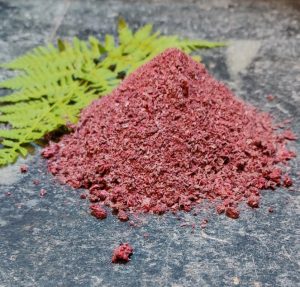
Cranberry is a healthy and fiber-rich vitamin bomb that helps with many ailments. It promotes good health and soothes the stomach and intestines, as it contains pectin and bitter substances, which are important for the health of the intestines, and also fiber.
Cranberry aims to support the well-being of the urinary tract, as the flavonoids contained in it restrain bacteria and may prevent them from attaching to the mucous membranes of the urinary tract.
Cranberries also contain antioxidants, vitamin A precursor beta-carotene, vitamins B, C, D and E, minerals and trace elements, and omega 3 and omega 6 fatty acids. In addition, cranberries are rich in a flavonoid compound called quercetin, which has been found to soothe allergic reactions.
Collagen UC-II®
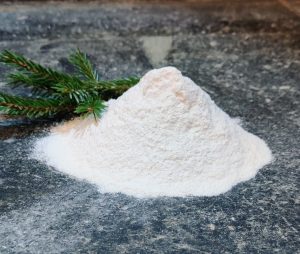
UC-II® (InterHealth Nutraceuticals) is a new proprietary ingredient - undenatured (collagen has not been heated or treated with chemicals) type II collagen derived from chicken sternum cartilage, which smaller dosage forms can be developed. UC-II® is supported by four published clinical studies examining joint comfort, mobility and flexibility. UC-II® is sourced and manufactured in the USA in an NSF certified GMP facility. It is both NDI (FDA Notified and Released New Nutrients) and GRAS (generally recognized as safe) – it is safe to use with rare or mild side effects and non-GMO (non-genetically modified). After its initial research, InterHealth has continued systematic scientific support around this ingredient. The efficacy, safety and quality of UC-II® have been carefully studied. Controlled studies (RCT) show that 40 mg of UC-II® once a day supports joint comfort, mobility and flexibility. UC-II® can be used alone or with other substances that affect the well-being of the joints, e.g. hyaluronic acid and curcumin.
According to the information received from the manufacturer of collagen UC-II®, UC-II® and hyaluronic acid (HA) do not cancel each other's effect, but work excellently together in the same product! "We are not aware of any interaction between Hyaluronic acid and UC-II which would be negative. It is used in other products so should be totally fine" According to the manufacturer of UC-II®, even glucosamine and chondroitin sulfate, despite some claims, do not reverse the effect of UC-II® "We don't have any evidence that the two ingredients - Glucosamine and Chondroitinsulfate – would have canceled each other out. They work via different mechanisms than UC-II so there should be no reason to assume that they would prevent one another working.”
The cartilage is largely composed of type II collagen fibers. Oral supplementation improves joint well-being and keeps them moving longer.
Collagens I and II
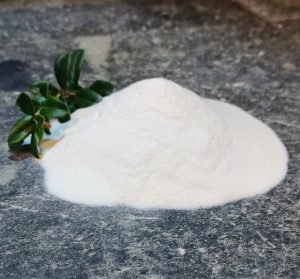
Collagens need to be broken down into amino acids so that they can be transported to the affected areas. Collagens are processed, as if "pre-digested", into amino acid chains, resulting in an easily digestible and absorbable product, collagen hydrolyzate, which breaks down in the body into amino acids and bioactive collagen peptides. Collagens activate the body's own collagen production when used internally. Due to their high tensile strength, collagens give tissues mechanical resistance.
type I collagen, which forms long strands in the cell medium, is the most common protein collagen in the body; it is especially found in bone, but also in tendons, ligaments and the dermis of the skin.
Cartilage, on the other hand, is largely composed of type II collagen fibers; type II helps prevent cartilage deterioration. Especially optimized bioactive collagen peptides promote the growth of cartilage structures and thus resist the wear and tear caused by aging and extra load. Thus, the oral supplement improves the health of the joints and keeps them mobile for longer.
Jakke products use bioactive type I and II collagens, which come from pigs. (UC-II® collagen is a different collagen, see previous)
Chondroitin sulfate
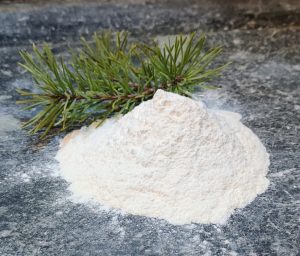
Chondroitin sulfate is a naturally occurring substance in joints; one of the main building materials of cartilage, which binds water to the cartilage tissue. Synovial fluid contains a lot of gel-like hyaluronic acid and chondroitin sulfate, which fill the empty spaces of the joints.
Chondroitin sulfate acts as a shock absorber and lubricant that treats joints. Chondroitin sulfate improves the mobility of the diseased joint, reduces joint cartilage loss and slows down the progression of osteoarthritis.
In all our joint care products, we use chondroitin sulfate, which is more than 90% derived from beef.
Turmeric (Curcuma longa)
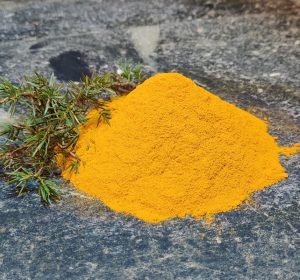
Turmeric belongs to ginger plants and its rhizome contains curcuminoids, which have an anti-inflammatory and anti-inflammatory effect. Turmeric is also rich in essential oil.
One of the significant uses is also various stomach ailments. Turmeric helps with loss of appetite, indigestion and hyperacidity of the stomach. Turmeric stimulates the secretion of digestive fluids and helps with all stomach ailments and also reduces the formation of intestinal gases.
Turmeric is effective against inflammation like cortisone, which is why it got the name "natural cortisone". Turmeric's curcumin also helps with musculoskeletal diseases, e.g. in joint problems.
Turmeric is antibacterial and a strong antioxidant, which weakens e.g. the viability of various bacteria, viruses and yeasts. Also helps in the treatment of asthma and skin problems. Researchers have shown that curcuminoids can effectively control inflammation, which supports the use of turmeric in folk medicine for the treatment of rheumatism, arthritis, eczema (rash), asthma, psoriasis and other inflammatory diseases.
Turmeric may cause heartburn in some dogs. Products containing turmeric are not recommended for pregnant bitches.
Lecithin
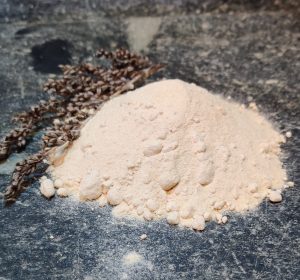
Lecithin contains a lot of phospholipids and unsaturated fatty acids (linoleic and linolenic acids, also known as Omega-3 and Omega-6). These fats are very important for cell function. Lecithin is good for the skin. Lecithin is also a valuable supplement for reducing stress.
Lecithin is also excellent for those exposed to or suffering from stomach ulcers, as it neutralizes stomach acids. Lecithin strengthens the hydrophobic (water-repellent) surface layer of the intestine; lecithin protects the stomach lining.
Our products use soy lecithin, which is GMO-free (not genetically modified).
Seaweed
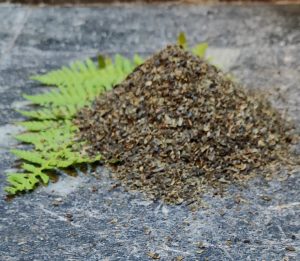
100% natural product
Seaweed prevents the formation of tartar and plaque on the surface of the tooth and thus also reduces the bacteria content in the oral cavity. The ingredients of the seaweed are absorbed into the blood during digestion, and thus the composition of the saliva changes, fluffing the tartar and preventing the attachment of new plaque deposits. The composition of saliva can help fight bacteria that cause plaque and tartar; effective against bad breath, tartar and plaque.
The seaweed we use is seaweed grown in the Outer Hebrides, which is rich in natural minerals, polysaccharides, amino acids, vitamins and other compounds that support your dog's diet and well-being. This seaweed grows in clean, cold and clear water and is handled and processed carefully and hygienically.
Seaweed supports the body's immune system and helps recover from stress. From seaweed, your dog gets plenty of omega-3 and omega-6 fatty acids, natural minerals and electrolytes. Seaweed strengthens the nails and is good for the dog's skin and coat, also good for the stomach.
MSM
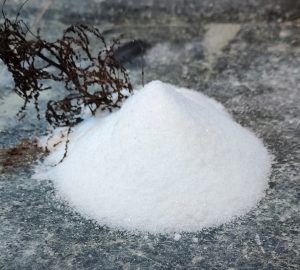
MSM (methylsulfonyl methane or organic sulfur) helps to maintain the natural functioning of muscles and joints and well-being. Sulfur is an essential part of producing good and healthy cells, it accelerates the metabolism and thus promotes tissue health and regeneration.
MSM is a naturally occurring sulfur compound found in small amounts in the body. It maintains joint mobility and supports many structures (their flexibility) and functions in the body, e.g. connective tissues, heart, blood vessels and the body's energy production. In addition, MSM also helps with digestive disorders, relieves muscle soreness and accelerates the healing of muscle injuries, promotes the health of the skin, coat and hooves.
MSM effectively and naturally relieves inflammation in the body. MSM is also helpful for osteoarthritis and various pain conditions, asthma and allergies.
In some dogs, MSM may cause heartburn.
Rosehip (Rosa canina)
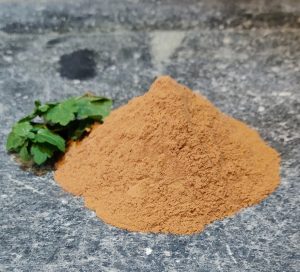
Roseberry is thevitamin C richest of all berries (1000 – 3000 mg/ 100 g) and it also has a lot of vitamin E. Rosehip contains e.g. bioflavonoids, antioxidants, amino acids, glucose, beta-carotene, copper, potassium, calcium, magnesium, zinc, iron, selenium, Omega-3 fatty acids, fluoride, vitamins A, K, D, B6, etc. Rosehip has traditionally been used to prevent anemia and has an immunity-enhancing property.
Rosehip is used effectively to maintain joint function and well-being. It has been found to effectively alleviate the symptoms of arthritis and osteoarthritis. Especially for dogs under heavy stress and for old dogs, rosehip is an excellent addition to feeding. The active substance is rosehip galactolipid, which curbs joint inflammation, improves mobility and reduces pain. Roseberry is the richest in vitamin C of all berries (1000 - 3000 mg/ 100 g). Vitamin C improves collagen production.
Rosehips also contain pectin, which is a soluble fiber and promotes intestinal function by lubricating it and balancing the protective mucus layer. In addition to this, pectin stabilizes the protective stomach lining and raises the pH value of the stomach. Rosehip pectin, like other soluble plant fibers, is also known to have a mild cholesterol-lowering effect. Today, rosehip has been found to lower blood cholesterol levels, increase bile secretion and strengthen the liver. The essential oils of roses are anti-inflammatory and anti-microbial and improve tissue regeneration and increase bile. In addition, rosehip sorbitol prevents hyperacidity of the stomach and increases salivation. The cohesive property of pectin and lecithin (thick and protective gel) helps the fibers (Laminaria and Ispaghul) adhere to the mucous membrane. In tests, it has been possible to demonstrate accelerated healing of ulcers when feeding pectin and lecithin. Pectin and lecithin protect a stressed stomach.
Rosehip also helps with the quality of nails, skin and hair.
Sea buckthorn (Hippophae rhamnoides)
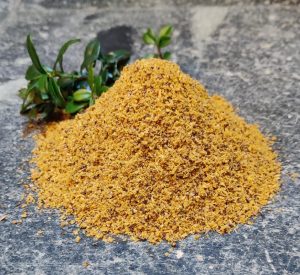
Sea buckthorn is really exceptionally rich in flavonoids, Omega oils and vitamins.
Sea buckthorn's flavonols are quercetin, myricetin, isorhamnetin and kaempferol, which affect e.g. the improvement of heart and liver function and immune response. The most flavonoids are found in the skin of the sea buckthorn and just below it.
The oil content of sea buckthorn pulp varies between 4-7%. No other berry has such a high oil content. Sea buckthorn seeds contain equally valuable oils, which can be separated from the seed in several different ways. Sea buckthorn oil is perhaps the most valuable ingredient of sea buckthorn, which contains e.g. oleic, stearic, linoleic, palmettoline and oleic acids. Vitamin E and cartenoid-rich palmettoline and linoleic oils are very favorable for fat metabolism. Palmettolic acid, which is important for skin health, is more than 30% in the berry flesh. More than 90% of the fatty acids contained in sea buckthorn are so-called essential Omega 3 fatty acids, which must be obtained daily. In addition, sea buckthorn also contains Omega 6, 7, and 9 fatty acids. Sea buckthorn seeds and pulp contain polyunsaturated fatty acids that have beneficial health effects. Sea buckthorn contains linoleic and alpha-linolenic acid. The body converts linoleic acid into GLA, which is needed to maintain good hormone function. Sea buckthorn oils have a favorable effect on the structure of mucous membranes. In the berry, you get these fatty acids internally and they protect the whole body.
Sea buckthorn is extremely rich in vitamins; e.g. Vitamins C, E and B, as well as beta-carotene in very high concentrations. Sea buckthorn is a well-known source of health and well-being. Vitamin C promotes normal immune function, helps reduce fatigue and protects cells from oxidative stress. The very high vitamin E and flavonoid content make sea buckthorn an effective aid in supporting the immune system. Many other substances contained in the berry also promote the absorption of active substances. Vitamin C and flavonoids work better together than separately, as do vitamin C and E together and vitamin E and beta-carotene together.
Strong resistance and vitality from sea buckthorn:
* to support immunity
* for continuous, year-round use
* for seasonal use
* for intensive courses for acute needs
* for combating fatigue
* as a versatile antioxidant for the whole body
* for the treatment of inflammation
Sea buckthorn has a strengthening, astringent and antiseptic effect on mucous membranes. Its sea buckthorn oil is good for the skin, mucous membranes, heart, blood vessels, circulation and the body's defense system. Sea buckthorn contains fibers that support bowel function. Sea buckthorn contains plenty of highly effective antioxidants that destroy the most common free radical that causes inflammation and damages the heart muscle, kidneys, intestines and pancreas. The vitamins, pectin and substance compounds contained in sea buckthorn have a favorable effect on digestive diseases and stomach ulcers.
Garlic (Allium sativum)
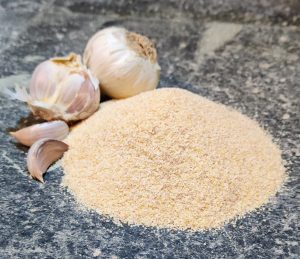
Garlic has been used for millennia, e.g. for improving immunity. Garlic is believed to increase endurance and strength. The best health effect is with long and regular use.
Garlic contains trace elements, minerals, B vitamins, vitamin C, selenium, antioxidants and sulfur-rich allin amino acid. Allin is transformed into allicin by the action of allinase enzymes, which helps maintain health. It prevents the hardening of blood vessels, expands blood vessels and thus improves blood circulation, lowers blood cholesterol, fat and sugar content. It improves general health in many ways - during the flu season it is worth using.
In addition, garlic fights microbes, fungi and viruses and is also effective against bacteria that have become resistant to some antibiotics.
Garlic also works as a very natural insect repellant – especially ticks! When properly dosed, garlic does not cause anemia in dogs.
Yucca
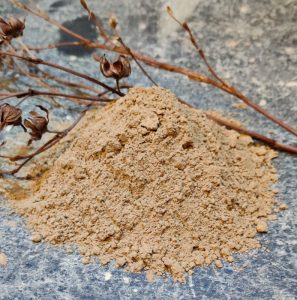
Yucca helps maintain the optimal pH value of the intestines in the digestive tract; the reduction of acidity has been found to contribute to health and vitality. Yucca increases energy levels by releasing glucose in the liver, which helps maintain the endurance required for exercise. Yucca helps to improve digestion and enables better absorption due to the acceleration of microbial activity in the intestines.
The saponins contained in yucca stimulate cell-mediated immunity and the formation of antibodies, enhancing local immunity. It has also been found to increase the effectiveness of food.
Yucca is rich in saponins that help nourish the joints. American Indians and Incas have used yucca for centuries for joint problems.
Product packaging
All Jakke product packages are recyclable plastic.
